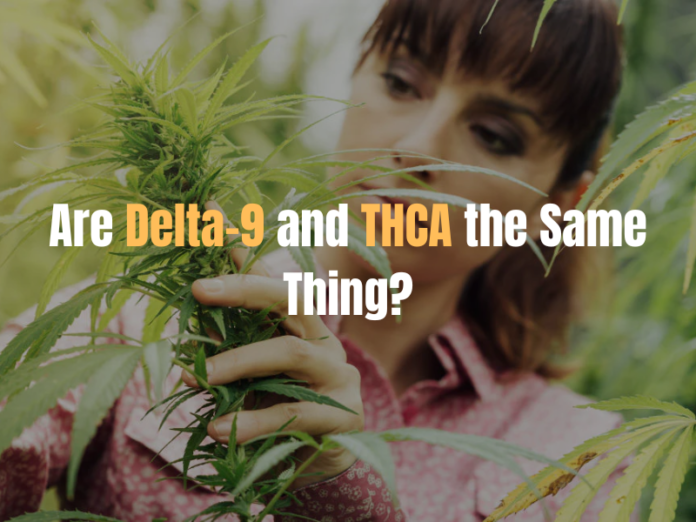If you’ve ever walked into a hemp shop or browsed an online dispensary, chances are you’ve seen products labeled “Delta-9” and “THCA.” To a casual observer, they might sound similar—or even the same. But for those who dig a little deeper into the cannabis plant, it quickly becomes clear that Delta-9 and THCA (tetrahydrocannabinolic acid) are two very different compounds with distinct effects, legal statuses, and uses.
So, are Delta-9 and THCA the same thing? In short: No, they are not. But they are closely related, and understanding how they interact can help you make smarter, safer, and more effective choices—whether you’re seeking therapeutic relief, recreational enjoyment, or a mix of both.
What Is Delta-9 THC?
Delta-9-tetrahydrocannabinol, commonly known as Delta-9 THC, is the main psychoactive compound in cannabis. It’s the cannabinoid most responsible for the “high” associated with marijuana. When you smoke, vape, or consume cannabis products containing Delta-9, this is the compound doing most of the heavy lifting in terms of euphoria, mood changes, relaxation, and even increased appetite (hello, munchies).
Delta-9 is found in both marijuana and hemp plants, though only in small amounts in hemp. You can buy Delta 9 legally under the 2018 Farm Bill as long as it comprises less than 0.3% of the total dry weight. Brands like Green Herbal Care have found creative ways to infuse this trace Delta-9 into compliant hemp-derived products—everything from gummies to vapes—so users can experience Delta-9’s classic effects while staying within legal limits.
What Is THCA?
THCA stands for tetrahydrocannabinolic acid. It’s the raw, non-psychoactive precursor to Delta-9 THC and is found in high amounts in freshly harvested cannabis. You can think of THCA as cannabis in its “sleeping” state—packed with potential but not yet activated.
On its own, THCA doesn’t get you high. That’s because it doesn’t bind well to cannabinoid receptors in the brain. But when THCA is exposed to heat (through smoking, vaping, baking, etc.), it undergoes a chemical process called decarboxylation, which turns it into Delta-9 THC. That’s when the psychoactive magic begins.
You don’t pay for Delta-9 THC when you buy THCA flower, but when you heat this cannabinoid, it turns into Delta-9 THC. This is why THCA flower has gained massive popularity in 2025—it’s legally hemp, but when smoked, it delivers effects nearly identical to traditional marijuana.
Delta-9 vs. THCA: Key Differences
Let’s break down some of the most important differences between these two compounds,
| Feature | Delta-9 THC | THCA |
| Psychoactive? | Yes | Not until heated |
| Found in | Dried, cured hemp and cannabis | Raw or live cannabis |
| Legal Status | Legal under 0.3% in hemp (per Farm Bill) | Legal in raw form in many states |
| Method of Use | Edibles, vapes, flower | Flower, tinctures, juicing, concentrates |
| Health Benefits | Pain relief, appetite boost, mood lift | Anti-inflammatory, neuroprotective (non-high) |
| Converts Into | – | Delta-9 THC (with heat) |
As you can see, while both are cannabinoids found in cannabis, their effects, uses, and even legality can vary greatly depending on the form you choose and how you consume them.
Legal Loopholes and the Rise of THCA
One of the biggest reasons THCA has exploded in popularity in 2025 is because of how it fits into the legal gray area. Since THCA for sale itself is not psychoactive and does not fall under the definition of Delta-9 THC, many vendors are selling high-THCA hemp flower legally—even though once it’s heated, it turns into fully psychoactive Delta-9.
That might sound like bending the rules, but under current federal law, THCA hemp flower is compliant as long as the Delta-9 content stays below 0.3% by dry weight. This legal nuance has allowed more consumers access to cannabis-like effects without needing to live in a recreational marijuana state or go through a dispensary.
Which One Should You Choose?
Whether you go with Delta-9 or THCA depends entirely on your personal goals and preferences.
Go with Delta-9 if,
- You want a predictable and strong psychoactive effect
- You prefer edibles, oils, or vape products
- You live in a state where hemp-derived Delta-9 is legal
Go with THCA if,
- You want a flower product that resembles traditional cannabis
- You’re interested in juicing or using cannabis raw for wellness
- You want to stay within a legal gray area and still get potent effects by smoking
It’s also worth noting that some people use both. For example, THCA flower for the daytime and Delta-9 gummies at night. The key is to know what each has to offer and how it fits into your lifestyle or wellness goals.
Potential Health Benefits of Each
Both THCA and Delta-9 offer their own unique wellness perks. Delta-9 has been widely studied for its role in managing chronic pain, nausea, anxiety, and insomnia. THCA, though less studied, shows promising results as a neuroprotective, anti-inflammatory, and anti-proliferative agent—particularly in its raw form.
Users report that THCA may be helpful in managing conditions like arthritis, muscle spasms, and even early-stage neurodegenerative diseases, without the mental fog or high that Delta-9 often brings.
Final Thoughts
Delta-9 and THCA are not the same thing—but they’re definitely related. One is the raw, dormant form of the other, and depending on how you use them, they can offer completely different experiences. Whether you’re after a strong psychoactive high or subtle wellness benefits without the buzz, understanding the difference is crucial.
And when it comes to exploring legal, high-quality options, Green Herbal Care is the best hemp dispensary. They offer a wide range of products—from hemp-derived Delta-9 to potent THCA flower—designed to meet the needs of today’s discerning cannabis user.

